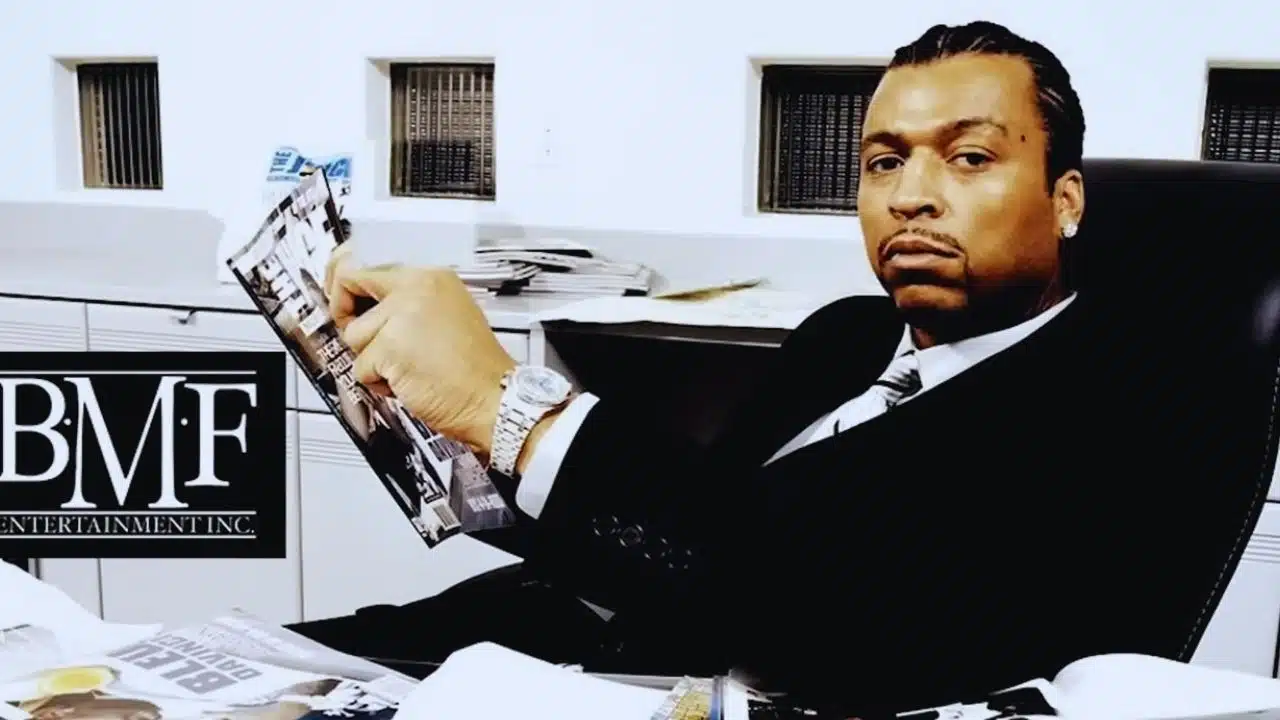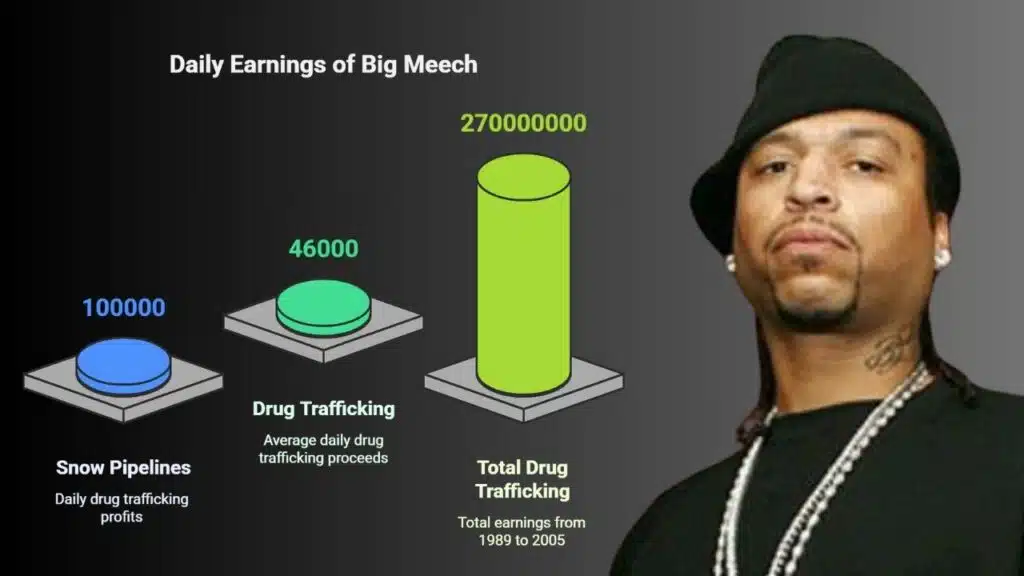Many fans ask how much did big meech make a day. They wade through tips and claims, hunting for real data.
Big Meech, aka Demetrius Flenory, co-founded the Black Mafia Family in 1985. By the mid-2000s, the crime ring had over 500 members. This post will lay out his daily earnings from drug trafficking, cocaine distribution networks, and their music label.
We will show money laundering paths, chart key numbers, and trace his legal fights. Keep reading.
Key Takeaways
- Demetrius “Big Meech” Flenory co-founded the Black Mafia Family in Detroit in 1985 and grew it to over 500 members across ten states by the mid-2000s.
- From 1989 to 2005, BMF moved about $270 million in cocaine, which averages to roughly $46,000 per day, and made about $100,000 daily when you add profits from BMF Entertainment money-laundering fronts.
- In October 2005, Operation Motor City Mafia agents seized $2 million in cash, stash houses, and 30 BMF members; Big Meech received a 30-year sentence under RICO in 2008.
- A judge reduced his term by nearly three years in early 2024; he entered a transitional center on October 16, 2024, and must remain until January 27, 2026, while BMF Entertainment still earns small streaming royalties.
- His story inspired the Starz series “BMF,” influenced hip-hop culture, and earned shout-outs from artists like Rick Ross, who famously wrote “Free Meech” on his wrist.
The Rise of Big Meech’s Financial Empire
He turned city blocks into cash labs, moving loads through a vast distribution network. He laundered millions via phony music events, shell firms, and left the DEA chasing shadows.
Founding of the Black Mafia Family (BMF)
Demetrius “Big Meech” Flenory and his brother Terry Flenory founded the Black Mafia Family in Detroit in 1985. Their network sprang from street corners into multiple states. The criminal organization moved cocaine, engaged in drug trafficking and ran money-laundering schemes.
BMF Entertainment served as a cover and channel for cash flow. Routes ran from Detroit to Atlanta, Chicago and Miami. The duo dodged a federal law agency (DEA) for years.
Nationwide expansion and operations
Big Meech built BMF on cash routes from Atlanta to Detroit. He hired over 500 members across ten states, according to Newsweek. They used stash houses and safe houses to store powder.
Co-conspirators pushed kilos with Mexican drug cartels. Agents from a federal law enforcement agency traced trucks via wiretaps. Members funneled millions through shell firms in money laundering schemes.
Secure phones carried coded messages from coast to coast. BMF Entertainment masked many wire transfers. Cops seized ledgers showing daily profits from drug trafficking. They cited links to the continuing criminal enterprise statute.
Operatives ran lanes in Detroit, Los Angeles, Miami, and New York. The network grew fast within a few years.
Daily Earnings of Big Meech
Meech pulled in roughly $100,000 every day from snow pipelines, plus extra coins from BMF Entertainment. The DEA clocked those green piles, while he and his crew raised a toast each sunrise.
Estimated daily profits from drug trafficking
The Black Mafia Family raked in roughly $270 million between 1989 and 2005. That sum works out to around $46,000 per day in drug trafficking proceeds. Demetrius “Big Meech” Flenory ran the cocaine distribution network.
Mexican drug cartels sent loads to Detroit, Atlanta, and beyond. The crew moved product fast, like clockwork.
BMF Entertainment often served as a front for money laundering. They paid off street-level dealers, dummy corporations, and club promoters. DEA agents found stashes in Chevrolets, downtown warehouses, and suburban houses.
Federal Bureau of Prisons filings later listed the seized mansions and cash. Agents tapped bank statements under RICO charges.
Revenue streams beyond narcotics
Big Meech created BMF Entertainment in 2002 as a hip-hop production brand. He signed acts and funded music videos that drove legit revenue. Flenory spun drug trafficking cash into studio fees and concert tickets.
He pressed CDs and sold merch to wash millions.
BMF Entertainment stood as a front for money laundering and extra income. He ran shell companies to hide bank transfers. Flenory used event promos and record sales to funnel clean dollars back into his street empire.
Key Components of His Financial Empire
Demetrius “Big Meech” Flenory ran a powder pipeline from Detroit to Miami, and he laundered millions through shell companies. He pumped cash into his record label, backed club showcases, and rolled in flashy rides to flex his status.
Cocaine distribution networks
BMF launched a cocaine distribution network in 2000. Big Meech and Terry flenory sealed deals with Mexican drug cartels and tapped sources in Los Angeles, moving kilos by private flight.
They ran stash spots in Atlanta, Detroit and Vegas, each site set to hide loads and cash. This ring fueled drug trafficking, money laundering and rap biz ties under the Black Mafia Family banner.
The Drug Enforcement Administration sniffed out the routes, but BMF kept shifting its game. Demetrius flenory cut quick deals at border points to keep supply tight and sales hot. Clubs, rap crews and BMF entertainment concerts got a steady flow of product, and stars like Rick Ross crossed paths with the crew.
Investments in BMF Entertainment
Demetrius “Big Meech” Flenory founded BMF Entertainment in 2005. The Black Mafia Family offshoot served as a front for money laundering tied to drug trafficking. It moved cash from cocaine distribution through concert tickets and record sales.
Flenory signed hip-hop artists such as Bleu Davinci and Rick Ross. Agents used shell companies to hide funds and buy studio gear and luxury cars.
Luxury lifestyle as a symbol of success
Big Meech flaunted his wealth with Gulfstream jets and Azimut yachts. He sat courtside at Hawks games and bought penthouses in Atlanta. He wore Rolexes and diamond chains from Jacob the Jeweler.
His rides rolled like a parade of speed and flash. He set up BMF Entertainment to sign rappers and fund tours.
The black mafia family brand lured new members with its glitz. Fans linked his luxury homes to drug trafficking gains. Lawyers traced money laundering through hidden firms. The BMF TV series replays his rise for curious viewers.
It charts his cocaine distribution networks and crime syndicate reach.
Investigations and Legal Challenges
The FBI used bugging gear and Grand Jury orders to bust BMF’s circle, and they froze dozens of bank accounts under the RICO Act. Agents staged dawn raids in Detroit and Atlanta under the Motor City probe, seized cars and cash, and you can check court files to see how Meech faced the music.
Operation Motor City Mafia
Agents hit stash spots across Detroit, seizing cash, guns, and loads of cocaine. Investigators put demetrius “big meech” flenory under heavy watch. They traced his drug trafficking network step by step, finding links to mexican drug cartels and secret money laundering hubs.
They dubbed the case Operation Motor City Mafia, and it blew the lid off the black mafia family empire.
Prosecutors indicted over fifty suspects, rolling up bmf entertainment leaders and street lieutenants. Courts froze bank accounts, locked down nightclubs, and seized luxury cars. Demetrius and terry flenory saw daily cocaine profits vanish in one sweep.
The raid paved the way for 2005 asset seizures and the 2008 sentencing of big meech.
2005 raids and asset seizures
October 2005 saw the DEA storm a stash house tied to the black mafia family and demetrius “big meech” flenory. Officials hauled off $2 million in cash and assets and cuffed 30 members.
They charged suspects with cocaine distribution, drug trafficking and money laundering.
The raid shook bmf entertainment’s money laundering ring. It slashed cash for cocaine distribution across state lines. This blow crushed core operations of the organized crime group.
2008 conviction and sentencing
A federal court found Demetrius “Big Meech” Flenory guilty in 2008 of running a continuing criminal enterprise. He admitted to drug trafficking and money laundering with BMF Entertainment.
The judge handed down a 30-year prison term. Prosecutors tied his cocaine distribution to massive daily profits.
The Federal Bureau of Prisons moved Meech to a high-security facility. He will serve most time behind bars. His final months might play out in a halfway house. Terry Flenory faced the same sentence.
Financial Impact of the BMF Downfall
Agents used forensic accounting and seizure orders to freeze BMF’s funds, stall its cash flow, and strip its assets like a winter storm—and the empire fell; read on to learn more.
Losses from arrests and asset confiscations
Demetrius “Big Meech” Flenory and Terry Flenory lost over $2 million in October 2005. Federal agents raided a stash tied to the black mafia family. They seized weapons and cocaine.
That strike crippled their drug trafficking and money laundering setup.
Operation Motor City Mafia tightened the noose on BMF Entertainment funds. Seized cash drained their reserve and pushed them to make risky swaps. Daily profits plunged under the weight of the bust.
Remaining wealth and legacy
A judge cut his sentence by nearly three years in 2024. The Bureau of Prisons released him on October 16, 2024. He now stays in a transitional center, until January 27, 2026. Some black mafia family entertainment deals still earn small royalties, across streaming services.
Street dealers still drop his name like a hot mixtape.
Law agents seized most assets during 2005 raids, and 2008 conviction. Lawyers still track drug trafficking cash, and money laundering trails. Fans fuse his exploits with Rick Ross rhymes, and Mexican drug cartels lore.
Shows like BMF (tv series) use demetrius “big meech” flenory’s rise as fuel.
Cultural Impact and Public Fascination
The Starz gangster drama shows Big Meech’s rise, fans tag each other on Instagram and Twitter, they spin Rick Ross tracks and dissect prison files—read on to see how his tale still shakes up hip-hop.
Depiction in the “BMF” series
Series paints demetrius “big meech” flenory as a bold hustler. Actors show his ties to mexican drug cartels and cocaine distribution. Writers stage black mafia family meetings in grand mansions.
Dialogue hits hard. It hints at money laundering and drug trafficking. Fans see his flashy cars and big stacks of cash. BMF Entertainment pops up in every episode.
Producers depict his arrest by agents from the federal bureau of prisons. A judge records that he has pleaded guilty. Episode cuts to his stay at a halfway house. Scene mentions demetrius flenory jr.
tagging along on deals. Actors play terry flenory in tense scenes. Rick Ross pops up in a club scene. Soundtracks mix hip-hop music business beats with street chatter. Show paints african-american organized crime with grit.
Influence on music and pop culture
Big Meech shaped hip-hop with BMF Entertainment. He gave street tales life in tracks. Rappers flash his logo on hoodies, they rap about cash flows and black ops. Rick Ross inked “Free Meech” on his wrist, he shouted out Big Meech in videos.
A premium cable channel aired a drama on the Flenory saga. The show pulled in millions, it seared BMF lore into pop culture.
Fans wear BMF caps like badges, they nod to a legacy of hustle. DJs spin beats that echo money laundering and drug trafficking schemes on big blocks. Brands chase that vibe like moths to a flame, they stamp narco style on tees and hats.
Filmmakers drop nods to BMF in films, they paint murals in city alleys. This street myth slips into mainstream, it feeds dreams and warns of danger.
Takeaways
Readers see a world where drug network profits hit six figures each day. His money laundering plans and music project deals show his skill at stacking cash. It feels wild. The justice bureau files and community center notes track his rise and fall.
Fans still talk, rap stars still copy his style, and TV crews still chase his story.
To explore more about the iconic figure behind the empire, discover how tall Big Meech is and delve deeper into his larger-than-life persona.
FAQs
1. How much did Big Meech make each day?
At its peak, the Black Mafia Family, led by Demetrius “Big Meech” Flenory, pulled in about $30,000 a day. This came from drug trafficking and money laundering.
2. How did BMF Entertainment fit in?
They used the hip-hop music business to hide cash. They also ran cocaine distribution for Mexican drug cartels. They even roped in Rick Ross, the rapper who took his name from Rick “Freeway” Ross.
3. What did Terry Flenory do?
Terry Flenory, Big Meech’s brother, ran drop spots and made big deals. He pushed the cash through BMF Entertainment for money laundering.
4. How did they dodge the feds?
They buried cash in shell firms. They cycled it through clubs and music gigs. This trick left law agents chasing shadows.
5. Where is Big Meech now?
He serves time in the Federal Bureau of Prisons. After that, he goes to a halfway house before he walks free.







































